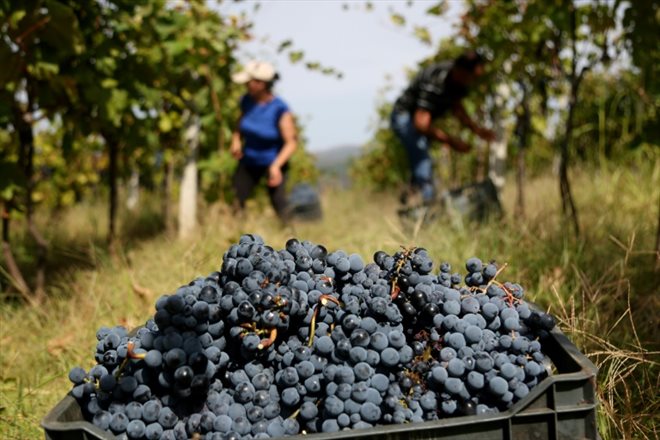Grapes of the Kallmet grape variety, in the vineyards of the village of Bukmire, near the town of Rreshen, Albania, September 21, 2023 (AFP/Archives/Adnan Beci)
Rising temperatures, hail and disease have damaged Mirdita’s grapes and left Albanian winegrowers destitute. After decades of cultivating vines, they must adapt to a warmer world.
In Prosek, a small village in this wine-growing region, Gjon Barllokgjonaj saw its production destroyed. “I have nothing left, I have lost everything,” laments this almost septuagenarian. Mildew and powdery mildew favored by a hot spring with many storms and heavy rains, then excessively high temperatures followed by drought, killed his grapes.
He will not produce any wine this year, and has decided to buy grapes to produce some of his raki, the traditional brandy of Albanian families.
At the bottom of the garden, Zhelena, 69, his wife, is fanning the flames under two large copper cauldrons two centuries old. Inside, the fermented grapes of the Kallmet grape variety will make a strong, but very aromatic raki, after passing through an artisanal distillation system. The light streaks that emerge measure around twenty degrees.

A vineyard of the Kallmet grape variety, in the village of Bukmire, near the town of Rreshen, Albania, September 21, 2023 (AFP/Archives/Adnan Beci)
“Certain areas, although small and isolated, were affected by violent hailstorms which had detrimental consequences on grape production,” Elton Basha, professor at the University of Agriculture in London, told AFP. Tirana.
A true nightmare for winegrowers, fungal diseases were particularly virulent this year.
Liza Ndoji is 70 years old and has around one hectare of vineyard. Like many families in the Bukmira region, she produces a few bottles of ruby-colored wine, which is said to please even the Vatican. But this year, his Kallmet grains are withered.
“Nothing has ever been easy but this year has been the worst.” From some 60 quintals of grapes last year, his vines have only produced seven to date.
– Go higher –
In the vineyards, “everything becomes more complicated: water stress, frost, drought, disease”, adds Zef Ndoji, a winegrower from Bukmira. With his wife, they farm at an altitude of 500 meters, which has allowed them to only lose a third of their vines.

Grapes of the Kallmet grape variety, in the vineyards of the village of Bukmire, near the town of Rreshen, Albania, September 21, 2023 (AFP/Archives/Adnan Beci)
Albania has more than 11,000 hectares of vines of different grape varieties which produce 190,000 to 195,000 tonnes per year, according to official figures.
“Even if Albania enjoys a diversity of microclimates that are very favorable for vines,” explains Mr. Basha, “faced with new challenges, small farmers who represent a considerable part of grape production have not had the ways to adapt.
Rigels Kacorri, whose family cultivates 25.5 hectares of Kallmet, has been working for several years with more than 60 small winegrowers in the region from whom he buys the grapes.
This year, he mainly favored soils at an altitude of around 600 meters, dotted with steel stakes that are more resistant to corrosion and able to withstand the humidity of the soil. He also began to develop new technologies to monitor plants, irrigation, etc.
But there is no question of changing to more resistant grape varieties, more adapted to altitude or genetically modifiable: he is keen on the indigenous Kallmet grape varieties which for him give “the true taste of good wine”.
The young man wants to believe that “sometimes, misfortune brings advantages”, and that this will push winegrowers to join forces to better adapt to the climate.
Elsewhere in the country, some are considering growing their vines… in a greenhouse, to protect them from bad weather.
But Zef Ndoji is very suspicious. “Wine produced from grapes in greenhouses can never have the smell of friendship. Who needs the rays of the sun from their natural environment.”
© 2023 AFP
Did you like this article ? Share it with your friends using the buttons below.




